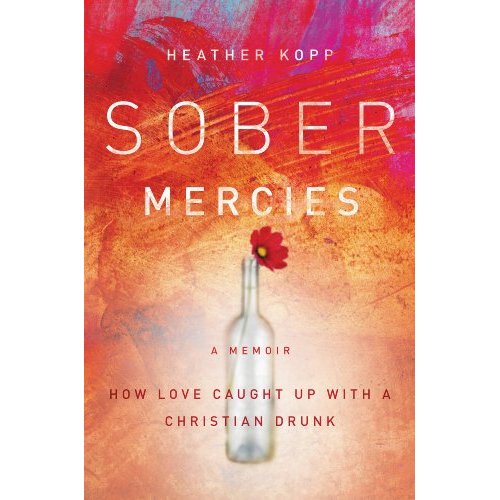Heather Kopp knows her chardonnay. And her dark reds. And her beer.
In the memoir Sober Mercies: How Love Caught Up with a Christian Drunk, which will release on May 7, Kopp details years of alcoholism. Although the book is often quite funny, her addiction is not a pretty picture.
She carried mini-bottles in her purse wherever she went, sneaking a drink in the bathroom of restaurants because she couldn’t make it through an evening without the sauce.
She lied to those she loved, and then lied some more.
She forgot entire conversations with her family members, and started scribbling in a journal when she was intoxicated just so she could demonstrate to her husband that she remembered what they had done and said the night before, thank you very much. She did not have a problem!
Except that as often as not, she couldn’t remember where she’d stashed the journal.
And did I mention that Heather Kopp was an evangelical this whole time? She was “Little Miss Christian, smug owner of the answer book,” who had worked for a Christian publisher and written books about faith.
She felt like a complete failure as a Christian, especially when people told her that her addiction was the result of sin. Great. But on the other hand, she resisted labeling alcoholism solely as an illness or a disease. As she puts it, “It wasn’t a matter of sin or sickness, but both.” It would take both faith in God and the intervention of medical professionals to assist her recovery — a long, rocky road marked with relapse.
There are some hard, hard truths in this book. At times it is painful to read, but I appreciate Kopp’s willingness to share the “rock bottom” part of her story, and the fact that being a Christian didn’t magically make her alcoholism all better.
One of the saddest moments is when she confesses that it was because of her drinking that she never allowed herself to have children with her second husband. She couldn’t imagine going nine months without a drink, and she cared enough about her would-be baby to know that drinking while pregnant was not an option.
In the end, Kopp’s memoir is about discovering a well of grace — the grace of a God who loves her as she is. She reflects on this while taking down her Halloween decorations:
When I was young, my siblings and I wouldn’t dream of using a measly bucket for our candy — we used pillowcases. And we’d stuff them. And we’d run, breathless, from house to house. Our family was always poor, candy was a huge luxury, and Halloween was almost as good as Christmas.
Maybe this is a picture of how God wants us to come to Him, too. Anxious to arrive, breathless with a good kind of greed for a grace more generous than we could possibly deserve.
Christians, she says, actually make the most miserable addicts. It’s ironic that they’re the most likely to come to AA meetings with walls up against God. We’re Christians, they tell themselves. We should not have this problem! Faith in Jesus should be enough! Others, by contrast, come to AA as helpless cripples, ready for any trickle of mercy that comes their way.
This book is about that mercy.






